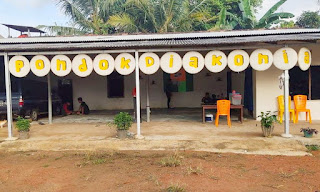Activity of Students at Pondok Diakonia
By: Lusiana
Sih Ayuning Tiyas.
Pondok
Diakonia held an activity through the Multiplication program of Stube-HEMAT in
Lampung, that is, discussion about Credit Union (CU) and journalism at Pondok
Diakonia training center, Batanghari, East Lampung (21/8/2021). This is an
enrichment program for young people at Pondok Diakonia to learn CU, how to
achieve prosperity, and to sharpen writing skills by arranging sentences and
expressing ideas systematically.
In the first session about CU, Candra Istiono, the supervisor, and Sugeng Asmoro, the manager of CU Sehati, explained that the Sehati itself was founded based on concern for others who are facing difficulties. Then, they collectively raise funds to help each other to meet their needs through productive efforts. Initially, in 1990 there were only 52 members with an initial capital of less than 2 million, and in 2021 the members of CU Sehati have grown to four thousand members with total assets of more than 29 billion.
The developing process of the CU seems easy, but there are challenges and hard efforts to be done. The challenges are faced with an optimistic attitude and wise decisions, as well as the awareness that realizing big dreams must start from small things and takes time. From the speakers' explanation, the participants learned the concept of CU, a joint business, and the owners of CU are the members who join the cooperative and have the goal for members’ welfare. Furthermore, participants get to know CU Sehati and its services, from membership and how to become a member, types of deposits and loans, loan terms and loan interest, loan guarantees, and mutual protection funds. In terms of benefits, the members have an alternative place to store money safely, easy to borrow money, get savings profits, and affordable loan interest.
In the second session, the participants practiced writing techniques with Dwi Setyo Harjanto, office staff, and Information Technology, experts from the GKSBS Synod. He said that 'without ideas, someone cannot write', so, when someone wants to write, he must have an idea or theme to write about. Then, when he starts writing, he must determine the point of view of writing so that the writing does not spread everywhere. Next, the writer determines the 'lead', whether the lead is summary, storytelling, descriptive, or citation. The 'lead' is the opening article that will determine whether the reader will continue to read or skip it. This means that 'lead' is the key that provoking someone's curiosity to read news or articles. Regarding the title, Dwi reminded me that there are times when the title changes. Do not let the title at the beginning block ideas in developing writing. So, it does not matter if there is a change in the title when the article is finished. In writing, it is necessary to remember two important aspects that must be considered, that is, language and relevance.
From
this activity, the participants learned to apply new experiences, as expressed
by Angel Prawesti, one of the youth in the dormitory, "I learned how to
write properly and correctly with 5W and 1H and CU materials that encourage us
to be diligent in saving and managing money well for the future." They
also initiated Pondok Diakonia student CU and wrote writings with a simple
theme, with the belief that success starts with persistence in doing small
things, and eventually grows into something big and beneficial. ***





Comments
Post a Comment